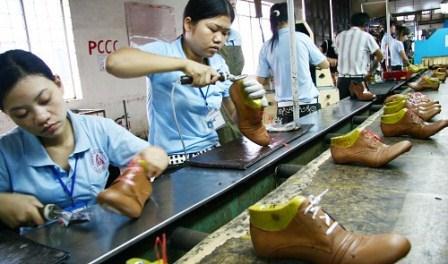
Leading shoe and designer clothing labels including Nike and Puma have made progress in tackling forced labor in their leather supply chains but could do more to address the issue at tanneries and ranches providing hides, according to a study.
It raised particular concern over China's largest shoe retailer, Belle International, which failed to provide any information on its leather supply chain in a survey and made no commitments for improvements.
The survey of five footwear and five luxury clothes brands was done by KnowTheChain, a resource for businesses and investors wanting to address forced labor within their supply chains.
It said information from the 10 companies generally revealed very little on how - apart from auditing suppliers - they addressed forced labor risks in countries which produce hides, process leather and manufacture leather goods.
But it singled out Adidas for praise, saying the German sportswear manufacturer had trained tanneries in Taiwan and China on how to deal with forced labor risks, and was taking steps to address risks at hide suppliers in Brazil and Paraguay.
Belle, which sells both its own brands and international brands, could not immediately be reached for comment.
Poor working conditions in leather supply chains have been well documented over the years, with evidence from countries like Pakistan, Bangladesh, and India revealing abusive practices including child labor, the study said.
It noted that workers at shoe factories in China - the world's largest footwear producer - had reported being forced to work overtime. Punishments for those who refused included having allowances docked or demotion.
The study said forced labor was a significant problem on cattle ranches in Brazil, the world's largest hide-producing country, with young men ending up in debt bondage after being brought to plantations by labor brokers.
"We believe that all companies in our case study either source or potentially source hides from Brazil and/or produce leather goods in China, thus are exposed to countries where we know forced labor risks are the greatest," the report said.
However, it said footwear brands were generally making headway, partly because of increased scrutiny.
Nike, the largest of the five footwear companies, was praised for leading the way in disclosing information on the workforce in its supply chains.
The study also highlighted Puma's grievance mechanisms set up for workers at suppliers in China, which include an SMS service and another via a popular social media network.
KnowTheChain called on companies to join forces to eradicate forced labor across leather supply chains, and suggested they collaborate with industries outside the sector such as meat companies and other users of leather like the car industry.
Source: Reuters
http://www.reuters.com/article/us-fashion-leather-forcedlabour-idUSKBN19E200
 FR
FR EN
EN AR
AR








